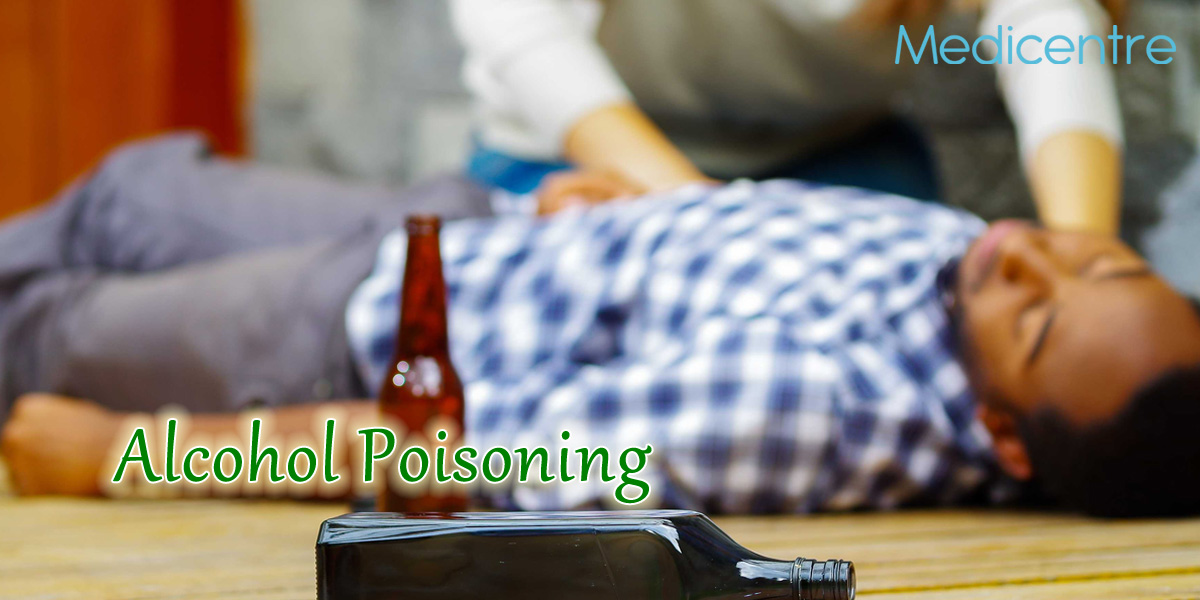Alcohol Poisoning
Must have heard people dying from overconsumption of alcohol? Well, it is all due to the poison we drink and that too more than the normal body alcohol content BAL which leads to the depression of the involuntary actions such as breathing and gag reflex that helps in prevent choking, so during overdosing of alcohol, the person will eventually stop breathing! It will affect vital functions like heart rate, body temperature, breathing by depressing them.

CAUSES:
The liver can only process only one serving per hour. So when you consume more than 1 serving/hour, ethanol content in the alcohol intoxicates the liver by accumulating ethanol in the bloodstream by slowing down its metabolism. Ethanol is metabolized to acetaldehyde by alcohol dehydrogenase and then it gets converted into acetic acid during intake of alcohol within normal BAL but whenever their overconsumption of alcohol beyond the normal range of BAL, acetaldehyde gets accumulated in the liver and then the initial symptoms of alcohol starts appearing like diarrhea, blurring of vision and abdominal pain. Other causes include:
- Binge drinking is one of the important cause which can last up to hours or days which includes heavy drinking of 4 or more drinks within 2 hours.
- Ethanol is found in many beverages, medications and even in household items.
- Other causes include isopropyl alcohol found in lotions and cleaning products and methanol found as an ingredient in paints and solvents can cause toxicity that can require emergency treatment.
FATAL DOSE FOR ETHANOL
- 550-1100 ml of whiskey is lethal.
- 6 gm of ethanol/kg of the body is fatal.
- In terms of blood, 400-500/100 ml of blood is lethal.
RISK FACTORS:
- Size and body weight
- Overall health
- Alcohol with medication.
- Percentage of alcohol in drinks
- Rate and amount of consumption of alcohol
- Frequency of intake
- Tolerance level
SYMPTOMS:
- Initial excitement then eventually depression in the brain centers
- Behavioral changes
- Drowsiness and finally coma
- Decreased coordination
- Slurred speech
- Trouble walking
- Vomiting
- Uneven breathing
- Choking
- Nasal decongestion
- Headache
- Cardiac dysrhythmias
- Atrial fibrillation
- Hypotension
- Bradypnea
- Lactic ketoacidosis
- Congested and inflamed GIT
- Erosive gastritis
- Chronic gastritis
- Cirrhosis
- Hepatic failure
- Impotence
- Sterility
- Testicular atrophy
- Gynaecomastia
DIAGNOSIS:
- Diagnosis can be made by the doctor by the symptoms described by the patient itself
- BLOOD TEST FOR ALCOHOL CONTENT
- BREATHALYZER UNITS
- FIELD SOBRIETY TESTS
TREATMENT:
- SUPPORTIVE CARE AND DECONTAMINATION: which includes stomach washing, hemodialysis, and I.V fluids.
- MEDICATIONS: include thiamine 100 mg I.V, dextrose if glucose levels are low.
- SELF CARE: which includes complete abstinence from alcohol or even reducing the amount of intake of alcohol.
- EMERGENCY TREATMENT: Call the ambulance if the person faints due to overdosing.
COMPLICATIONS:
- Seizures
- Aspiration pneumonia
- Hypoglycemia
- Hypothermia
- Permanent brain damage
- Abnormal heartbeat
- Irregular breathing
- Death